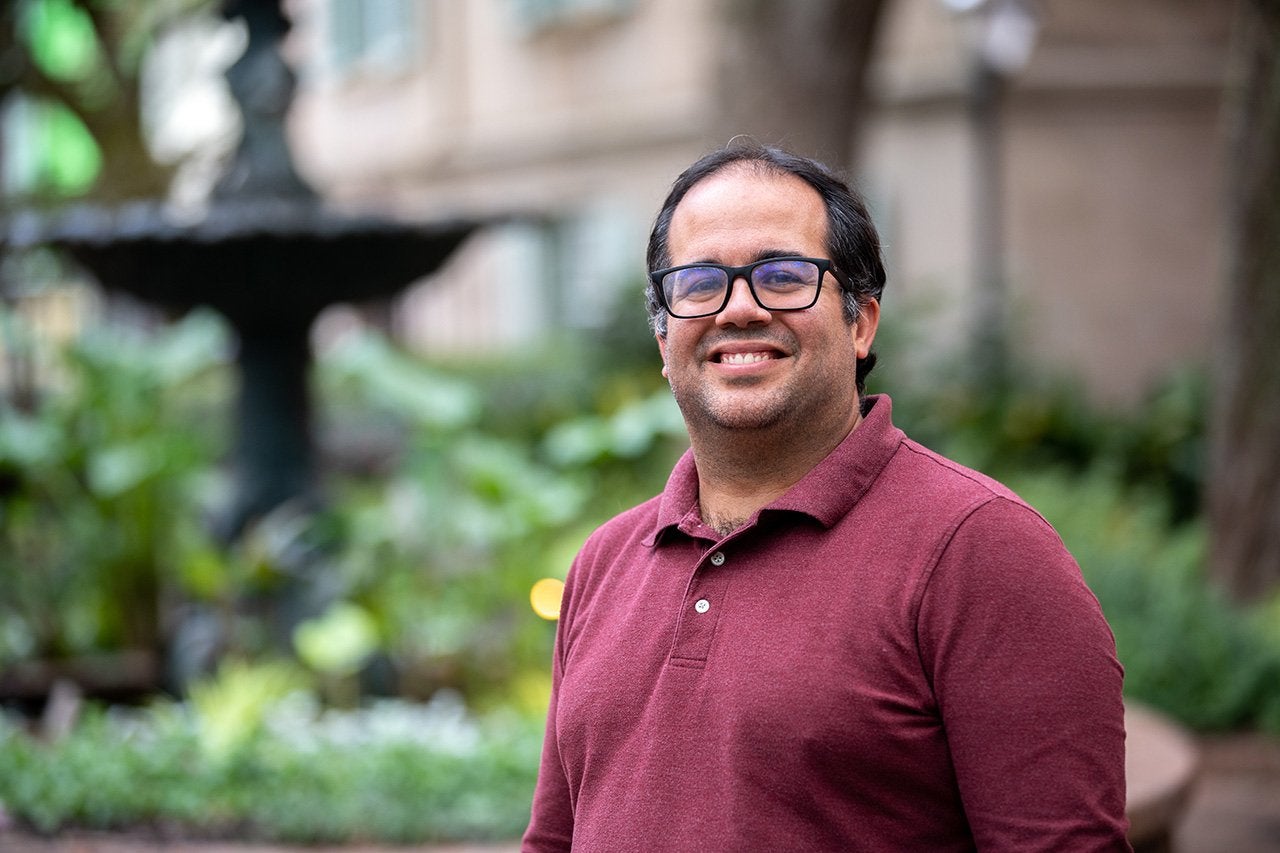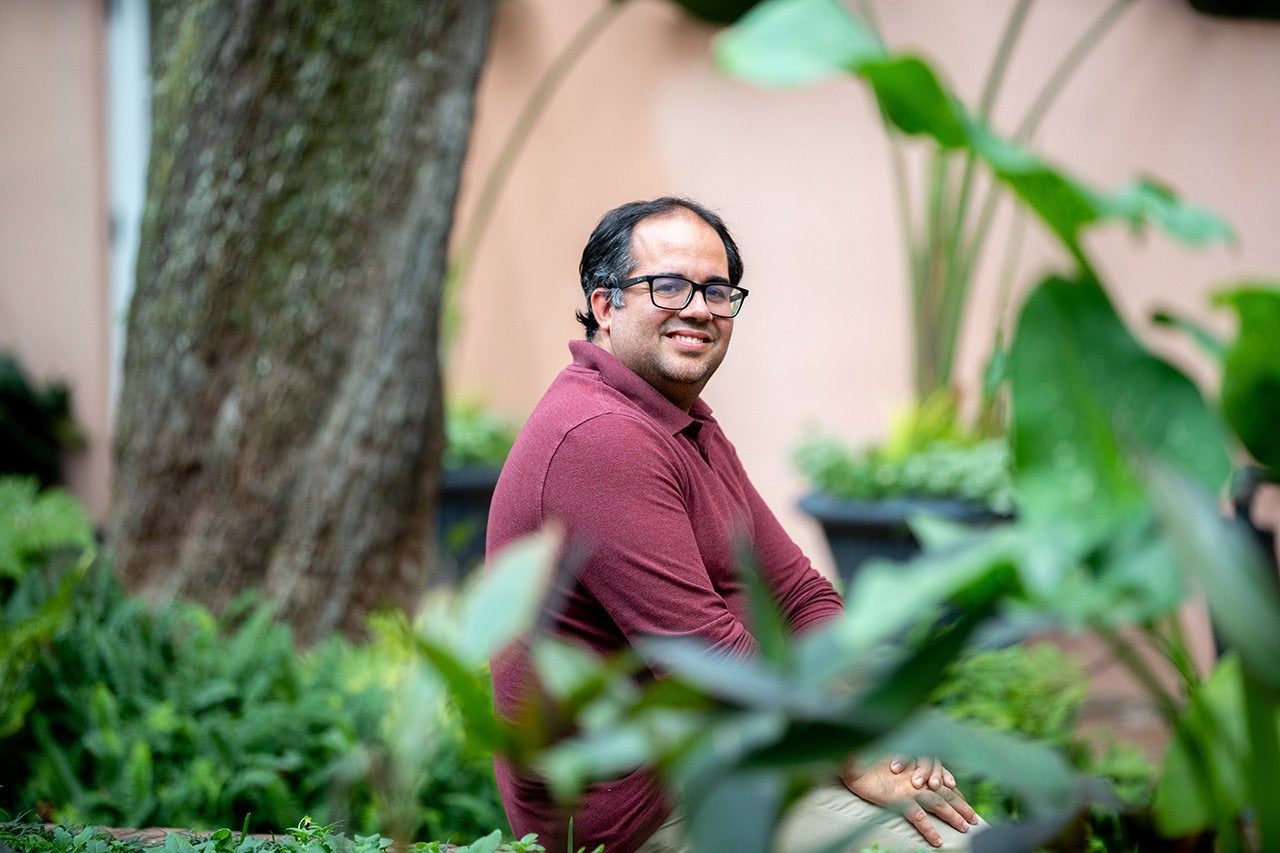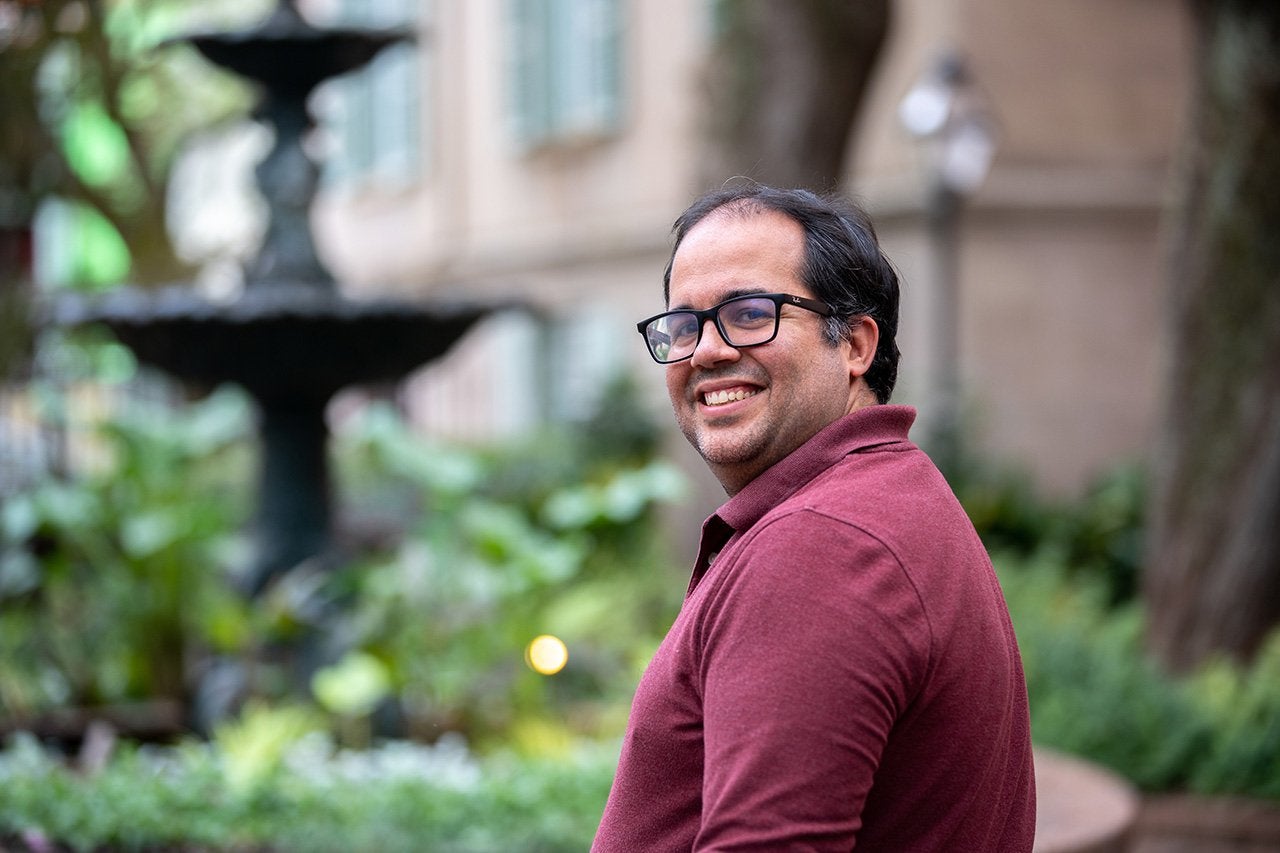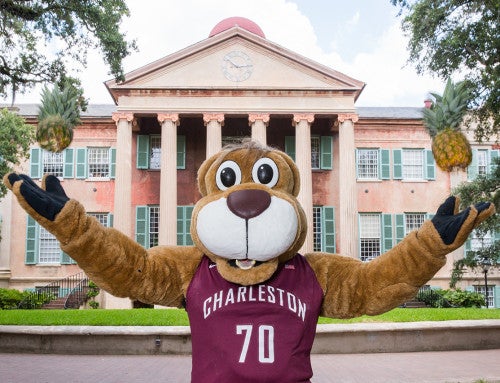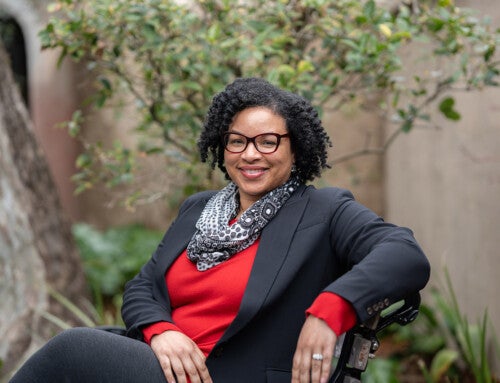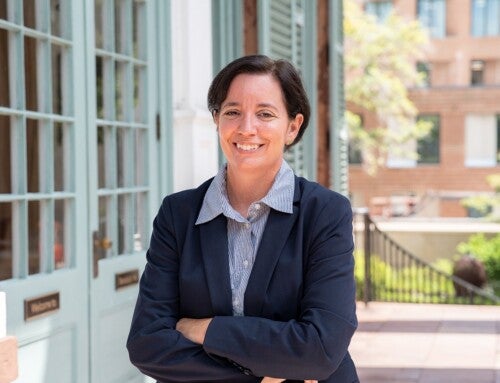Name: Michael Giuliano
Hometown: I was born and grew up in the suburbs around Philadelphia, Pennsylvania.
Education: B.S. – Villanova University; Ph.D. – University of Wisconsin, Madison; Postdoctoral Research – Yale University
Job title: Assistant Professor, Department of Chemistry and Biochemistry (my tenure packet went in this past fall, so fingers crossed this one changes soon!)
How long have you worked at the College? This is now seven years at the College. I joined the faculty at the start of the 2015 fall semester. It feels like a while, but also as if it’s been in a flash, all at once!
What are your job responsibilities? My time is almost entirely dedicated to undergraduate teaching and research. I teach three courses per semester, almost always organic chemistry lecture and lab, often in the Honors College. I also teach an organic chemistry recitation class that I helped develop together with the organic chemistry faculty. Together with my colleague and great friend Dr. Jay Forsythe, I’ve taught a research-based combined lecture and lab elective in bioanalytical chemistry that we co-developed from our combined expertise in peptide chemistry and analysis.
I run an active, solely undergraduate research group that studies the structure and biophysics of a family of human signaling peptides, the neuropeptides that carry out a wide array of functions in the human body, from mood alteration and pain signaling to sleep and appetite regulation. We rely heavily on nuclear magnetic resonance (NMR) spectroscopy to determine three-dimensional structures of the molecules that we study, which we synthesize chemically in my laboratory. To date, I’ve had 18 students come through my lab, and we’ve disclosed eight new peptide structures in our work. We’re at it in the lab all year long, most especially in the summer but also during the academic year. Part of the research endeavor is also keeping up with current scientific literature, and playing my part in that process by both publishing and peer-reviewing articles for a number of journals. I also travel to conferences and other institutions when possible to give talks on my group’s work – and ideally bring students to conferences, too, so they’ll get the critical experience of communicating their research.
When I’m not in the laboratory, I’m writing grants to secure funding for research or serving on various departmental and campuswide committees. One aspect of my job that’s important, but not an official requirement, is community outreach. Science literacy is at a critical juncture, emphasized even more as we navigate COVID-19. I carry out chemistry demonstrations at local elementary schools, for visiting student groups and children on our campus, and also for a nonprofit after-school program in North Charleston. Who knows where those next great scientists and doctors will come from? We need to make sure as many people, from as many backgrounds as possible, are involved and that a scientific career is accessible to everyone.
What do you like most about your job? Oh, for sure my students! (Don’t worry, I love my colleagues, too!) The great privilege of my job is getting to work with young people and help them find success. This is true whether it’s in the classroom, the teaching lab or the research lab. I am always amazed by my students – their sheer brilliance, their awesome work ethic and their high character. You’ll never hear me down on them. They’re eager learners, willing experimentalists and wonderful colleagues in research. All the while, young people today have to balance their studies often with nearly full-time work, and they’re trying to find their places in a world and society facing huge, existential problems. I worry about their wellbeing all the time and I cannot be anything but tremendously impressed with their ability to succeed, and tremendously grateful for the time and earnest effort they put into my classes and research laboratory. When I say it is a privilege to be their professor, I really do mean it, and they inspire me to always want to do better in my job.
What question do you get asked most in your job and what’s your typical answer? “Why is organic chemistry so hard?” Well, we’ll address the elephant in the room here. I’m an organic chemist, and this is the question I get asked. It’s the worst when it’s at a dentist’s office and they’re holding any array of sharp objects! All kidding aside, historically this discipline gets a bad rap because it gets treated and taught like a weed-out course, and this negative cycle became self-reinforcing and self-fulfilling. I find that heartbreaking and it’s a big source of motivation in my own teaching and that of my colleagues here at CofC; this subject was never that for me, and I strive to make it anything but that in my own courses. Organic chemistry is a foundational science – a key molecular perspective on the very processes that make every living thing, including us, work. It is at the root of how we develop modern medicines and the very many industrial materials that society depends upon. Done right, the class empowers students and gives them new skills in problem solving and long-chain logic and critical thinking. Done wrong, well, it’s maddening as an organic chemist, and I know my colleagues share this perspective.
So why is it tough? I think back to a comment made to me when my graduate PI worked with me on crafting lectures – he referred to organic chemistry as a “pictorial language.” A new language analogy is used often in this subject, but I think it’s most apt when we consider that language to be something like hieroglyphics. We draw pictures – structures – and they have distinct meanings, and interact with each other according to very specific principles and sets of rules. Up until this course, most students’ experience of chemistry has a healthy dose of mathematics, as do many of the physical sciences, so there’s just not much experience with a subject like this one before encountering it. Human learning is so heavily reliant upon pattern recognition, and organic chemistry just doesn’t fit patterns in a way that bears much familiarity to what students have seen before. I think I have a conversation like this one about once a week. I always add this – it is so unbelievably rewarding to see students who were otherwise convinced this material was not something they could do learn to master it and, to their own surprise, enjoy it!”
What’s your favorite location on campus and why? Especially when I need to work on stress, I love taking a walk down Green Way and through older parts of campus over a cup of coffee. It’s beautiful, and staying mentally present while I do that helps me process whatever is happening.
What are your hobbies? Cheering rabidly for all things Philadelphia sports, especially the Eagles! I wish the Philadelphia sports fan stereotypes didn’t apply – but, yeah, they come out sometimes; Dr. Forsythe, mentioned above, also from Philadelphia, calls that version of me “Philly Mike.” I promise I keep that under control on campus. I also love soccer – playing it, watching it and now coaching it. All four of my daughters play, and I help coach two of their squads when I can. Some of my earliest memories of being a sports fan were finding a way to watch the U.S. play in the 1994 World Cup, since back then soccer just wasn’t as big here. My dad rigged an antenna on our TV, and I got to see Marcelo Balboa throw his now-famous bicycle kick. I was never super athletic, but soccer was a game with a place for me, and it’s been a joy to have it still be, and now help it serve that purpose for my girls. Playing on weekends, watching major tournaments, watching professional matches when I can convince the kids to turn off cartoons – it’s a family affair now!
What personal and/or professional accomplishment are you most proud of? Getting a faculty position. When I got the job at the College of Charleston, it was something I had begun working on really since I started pursuing chemistry in college, 13 years prior. It was a lot of moving for my young family and me over the years with so many late nights and intense hours. I’ll never forget my wife looking at me teary eyed and saying, as our plane landed for a house-hunting trip, “We get to live here!”
Name a creative work (book, movie, performance, etc.) you enjoyed recently – why? I got really into the work of N.K. Jemisin over the pandemic. Her Broken Earth trilogy was really affecting, and everything by her I’ve read since then has been impossible to put down. She builds beautiful, immersive worlds, and tells engrossing and thrilling stories from perspectives and voices not historically represented in science fiction and fantasy.
What was your favorite TV show growing up? He-Man and the Masters of the Universe, and it wasn’t close. I’ve watched all the old cartoon episodes with my kids now as an adult, and I’m pretty sure I still like it more than they do – I mean, it’s not uncommon to see me walking around in a Battle Cat T-shirt. After that, it was The X-Files, which was probably a byproduct of being then (and now!) a huge sci-fi fan.
What’s next on your bucket list? So, in 2023/2024, Melissa and I will both turn 40 and we’ll celebrate 15 years of marriage. We’re planning a trip to Italy, which is something we’ve always wanted to do together, and are super-excited about it.
What is something your campus colleagues would be surprised to know about you? I almost wasn’t a chemist. I grew up in the home of a carbohydrate chemist, my dad, and just loved all of my science classes growing up. But, until near the end of high school, I was really struggling to decide what to pursue in college. From grade school onward, I had been involved in music in nearly every way I could be – marching band, concert band, orchestra and chorus in school, playing the marimba, oboe and English horn and singing baritone. I played oboe and English horn for a youth orchestra, in chamber groups and at local churches, and also played piano. I also was active in musical theater from eighth grade up through my junior year of college, and loved every minute of it. Music was my life and so much fun. In the end, though, the frequent auditioning process began causing me huge anxieties and was taking away all of the joy I derived from music, and I couldn’t let that happen anymore. I still play both oboe and piano regularly, but just for the joy of it and everything else music gives me. There also was just no good way to keep up with chemistry as a hobby (at least not without getting arrested)!
What was your first job? I worked with the facilities management department at Villanova University for less than six bucks an hour when I was in high school. I was really small back then, and they needed someone who could climb up into crawlspaces, attics and giant air handlers to fix all kinds of issues on campus – plumbing, wiring, alarms, drywall – all things I have to fix on my own house now. I learned a ton, and the guys there were hilarious and pranked each other all the time. It was a blast!
What’s your favorite Lowcountry restaurant? We had never been to Halls Chophouse before, but got there for our wedding anniversary this past April after having not been able to get out together much at all during the pandemic, and it was just amazing and a really special night. The Wild Olive out on Johns Island is really great, too.
Describe your perfect day. Waking up to make pancakes with the girls over a cup of coffee, with the Pirates of the Caribbean soundtrack playing in the background as my 3-year-old sword fights me with kitchen utensils. Then, we’d load up the minivan, and all six of us would head down to Folly Beach for the morning. We’d come home for a lazy afternoon, maybe catch a soccer game, or even go play one for a little while. That evening, we’d enjoy some good barbecue and a family movie. After the kids are in bed, Melissa and I would enjoy a glass of wine out back by our fire pit under the beer garden lights I put up on our patio.
To nominate a faculty or staff member to be featured in the “CofC Faces to Know” series, please send the person’s name and email address to [email protected]. Please include “CofC Faces to Know” in the email subject line.

